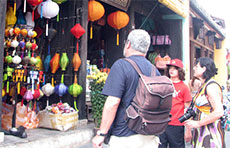
Thuy said the province, home to Hoi An's ancient town, the My Son Sanctuary and the world bio-reserve Cham Island, had the potential to boost tourism development.
"Shared benefits from tourism ease the economic conflict between the local administration and the community. Local people need a fund to restore their centuries-old houses. It means that part of the revenue from ticket sales has to be used to restore the old houses," she explained.
Tourism has created a stable income for 12,000 people doing business in Hoi An's old quarter, Thuy said.
"The town allocates 55 per cent of total ticket sales for the restoration the old houses as well as promoting the tourism with car-free campaigns, pedestrianised streets and festivals," she explained.
She said souvenir shops, tailor's, restaurants and craft villages all benefited from the city's brand name promotion.
Thuy said local people lived well on the income generated from tourism.
Tourism revenue in Quang Nam surged four times from 2000-12 after Hoi An and the My Son Sanctuary were recognised as world heritage sites in 2003.
However, the city's trade and tourism office is till trying to work out how to share the benefits equally.
"Nine families who work in Thanh Ha pottery village get 40 per cent of ticket sales (VND15,000-USD0.7 each ticket). Each family receives around VND400,000 (USD19) a month - quite a low rate for local craftsmen," Thuy explained.
Nguyen Lanh, an old craftsman, said he continued to ply his trade because it was his passion.
He said he and his wife - the oldest villagers - still worked in his workshop.
"We expect to improve our income with the increasing number of tourists visiting the village. If we sell out products, we will preserve the old trade," he said.
Pham Vu Dung, a manager at Rose Travel Agency, said his company had to share the benefits from tourism services with local people in order to promote home-stay services in the mountainous district of Dong Giang.
"We have to provide funds for accommodation, sanitation, hospitality and tour guide training. Local people can improve their incomes from tourism services after the harvest."
A report said that Quang Nam's tourism industry had contributed VND3.5 trillion (USD167 million) over the past decade, equal to 10 per cent of the province's Gross Domestic Product (GDP).
In the first six month of this year, the province has welcomed 1.6 million visitors with a revenue of VND1.8 trillion (USD86 million).